SUMMARY
This is AI generated summarization, which may have errors. For context, always refer to the full article.
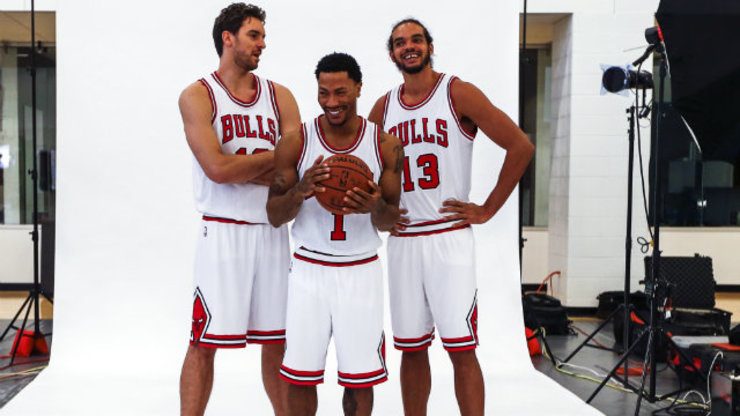
It’s always fashionable to tab a team that has LeBron James as the favorite to at least fight for the NBA championship. This is even more so in the case of this year’s Cleveland Cavaliers, who not only saw their native son return to his home state after an acrimonious parting in 2010 but also join two other bonafide All-Stars – Kevin Love and Kyrie Irving – and a cast of promising youngsters and battle-scarred veterans. Now, isn’t that a really formidable ball club one has there?
The Cavaliers, after wandering in the Ohio dirtlands for the past four years that James was leading Miami to four NBA finals and two championships, have suddenly found their little-known plan of bringing back their prodigal son and surrounding him with another big gun come to life. Hardly did anybody know that Cavs owner Dan Gilbert and GM David Griffin were working feverishly, if quietly, behind the scenes and promising James that if ever he returned home, they would give him a partner, Love, who can serve as his main buffer. The rationale here is the Cavs would have to make life easier for LeBron to convince him to come back to Ohio, in effect replicating the Big Three days he enjoyed in South Beach in tandem with Love and Irving, the Cavs’ resident All-Star who this summer proved his worth by leading the US to the gold medal in the FIBA World Cup in Spain.
But then, one also has to consider that formidable or not, the Cavaliers, or any team for that matter, won’t be existing in a vacuum, and could always find a counterpart, a matchup, if you will, that can put a roadblock to the best-laid plans like the Cavs’. Enter the Chicago Bulls. (RELATED: Are the Bulls the new East favorites?)
The Windy City club may not be as head-turning or potentially as explosive as the Cavaliers but are looking like the kind of team whose incremental, piece-by-piece improvement may just be what it takes to top the Eastern Conference this year. The Bulls are returning not only the cast that brought them to a sixth straight, though ultimately disappointing, playoff stint but are also bringing back their own son, Derrick Rose, MVP in 2011, and adding a trio of frontliners made up of two-time champion Pau Gasol and rookies Doug McDermott and Nikola Mirotic.
This represents a great improvement from the offensively-challenged bunch that went out quietly in the first round last year against the Washington Wizards.
What makes these Bulls a little more prepared for the battle at the trenches is that they’ve played together for a longer period, and have been used to the defensive schemes of coach Tom Thibodeau to make it all work now that they have a full complement of players needed to go deep into the postseason.
Out West, meanwhile, the defending champion San Antonio Spurs still look, well, formidable themselves, although this is not because of any franchise-altering addition but because of the old, time-proven team system that they have always employed to near-perfection. True, the Spurs are also bringing back the entire team that gave the Miami Heat a clinic in motion offense in last year’s finals, but it’s still the system and the discipline to stick to this system that make the Spurs your atypical champion team built on chemistry and talent.
The Spurs do still have Tony Parker and Tim Duncan, both of whom re-upped in the offseason, along with Manu Ginobili, but the Big Three are closer to the end than the middle of their careers, and keeping them healthy, in fact, is one of the primary goals to keep these Spurs firmly in the mix.
(RELATED: Back-to-back titles remain Spurs’ unfulfilled goal)
The primary challenge to the Spurs in the conference is expected to come from Oklahoma City and the Los Angeles Clippers, both of whom were involved in a heated matchup in last year’s playoffs, a matchup eventually won by the Thunder in six games. But Game 5 of that series has left a bad taste in Clippers coach (and concurrent team president) Doc Rivers’ mouth to this day.
Rivers wouldn’t say it now but he still believes the Clips, who led by 13 with four minutes left in that game and by seven with 50 seconds to go, were robbed of a legitimate win when the referees gave the ball to the Thunder with 11.3 seconds remaining even while it looked like the ball went off Thunder guard Reggie Jackson. That play, even as an apparent foul earlier on OKC’s Russell Westbrook was not called, led to three free throws by Westbrook on a three-point shooting foul by Chris Paul that won it for the Thunder 105-104.
The Clippers, with center Spencer Hawes and veteran point guard Jordan Farmer joining the club, are poised to pick up where they left off last season, the best in the franchise’s often-turbulent history and the last in an unlamented 33-year reign of owner Donald Sterling, who in the offseason was forced by the court to sell the team for a record $2 billion to former Microsoft CEO Steve Ballmer in the wake of racist remarks he made that became public.
The Thunder, on the other hand, are hoping that the break in reigning league MVP Kevin Durant’s right foot will not affect the latter’s long-term ability to play at that level and thus upset the franchise’s fortunes. Last year’s roster is practically intact, with rookie frontliner Mitch McGary and free-agent guard Anthony Morrow added around the fringes after veteran playmaker Derek Fisher’s retirement to become the head coach in New York. If OKC survives Durant’s estimated one- to 1½-month absence, the Thunder could become an even tougher bunch.
So who will make it out of their respective conferences to arrange a finals matchup? At this point, the Spurs out West and the revived Cavaliers in the East seem to be the popular choice of preseason prognosticators. But while we also favor the Spurs, we don’t want to jump on the Cavalier bandwagon just yet and proclaim LeBron and company the class of their conference. The Cavs still have to undergo a process, and they have to prove, for one, that they can adopt new coach David Blatt’s intricate Princeton offense seamlessly to make things work instantly.
When push comes to shove, however, the betting here is that it won’t be that easy particularly in the face of a team, the Bulls, that can just spoil the party.
But a lot is contingent on what happens from hereon in until the season runs out, or until the last shot is fired or the last second ticks off the clock. As Zach Lowe says, too many unknowns – injuries, chemistry problems, coaching or ownership changes, sudden change in form, or just plain casual tomfoolery – could take place and impact a team’s fortunes.
Still, we’d like to take a shot. And here’s our take on the upcoming season, starting with the Eastern Conference (teams are listed in the order of their projected finish, with last year’s rankings and records in parentheses).
EASTERN CONFERENCE
Atlantic Division
1. Toronto Raptors (1st, 48-34)
Key additions: Lou Williams (Atlanta), James Johnson (Memphis)
Key losses: John Salmons (New Orleans), Steve Novak (Utah)
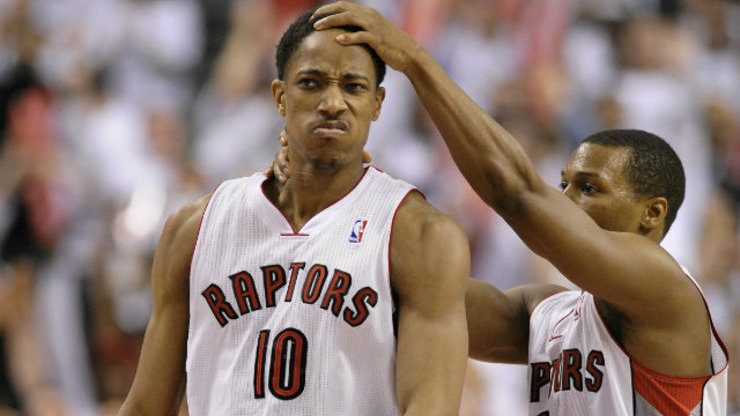
The Raptors are poised to go for their third division title in franchise history with basically the same cast that brought them their second last year. Led by Team USA member DeMar DeRozan and Kyle Lowry, the Canadian club has the depth and the talent to do it. DeRozan (22.7 ppg) and Lowry (17.9 ppg, 7.4 apg), who underwent a rebirth of sorts with the Raptors last year to merit a four-year, $48 million extension, are the leaders of this club but it’s ironically the improvement from seven-foot Lithuanian center Jonas Valanciunas (11.3 ppg, 8.8 rpg) that could spell how far this team can go. The Raptors surprised a lot of people last season by topping the Atlantic while earning their first playoff berth since 2008, and with such talent as guards Terrence Ross, Louis Williams and Greivis Vasquez and frontliners Amir Johnson, Patrick Patterson, Chuck Hayes and James Johnson also at coach Dwayne Casey’s disposal, are capable of keeping their new-found stature as a high-seed playoff club. The only question is how high their ceiling could be.
2. Brooklyn Nets (2nd, 44-38)
Key additions: Jarrett Jack (Cleveland), Sergey Karasev (Cleveland), Bojan Bogdanovic (rookie)
Key losses: Paul Pierce (Washington), Shaun Livingston (Golden State), Andray Blatche (China), Marcus Thornton (Boston)
So much for the “all-in” experiment. Once Brook Lopez went down with another foot injury after having played his 17th game in December, the Nets’ dream season was gone. They did recover somewhat and went on to advance to the second round, but this is obviously a different season and a different mindset (not to mention Russian owner Mikhail Prokhorov entertaining visions of cashing in after that delectable LA Clippers sale). Paul Pierce is gone, Jason Kidd also is but has been replaced by a coach, Lionel Hollins, that would know how to harness his talent better (besides acting with more decency and decorum), and the veteran-driven championship expectations have definitely been put in the backburner. What we have now is (still) a veteran-laden team made up of Deron Williams (14.3 ppg, 6.1 apg), hopefully freed after surgery from his ankle problems, Joe Johnson (15.8 ppg), who, if you didn’t know, is the league’s top clutch shooter these past three seasons (63 percent on 17 of 27 go-ahead shots with his team behind in the last 30 seconds), Kevin Garnett, Andrei Kirilenko, Jarrett Jack, Alan Anderson and Lopez plus youngsters Mason Plumlee, Mirza Teletovic and Bojan Bogdanovic, a rookie sleeper.
3. New York Knicks (3rd, 37-45)
Key additions: Jose Calderon (Dallas), Samuel Dalembert (Dallas), Cleanthony Early (rookie), Shane Larkin (Dallas), Jason Smith (New Orleans)
Key losses: Tyson Chandler (Dallas), Raymond Felton (Dallas)
Year 1 of the Phil Jackson era has Derek Fisher implementing the Zen Master’s triangle offense and Oriental mind concepts, and this will be a test for both the rookie coach and this revamped bunch led by Carmelo Anthony. These Knicks, on paper, don’t especially inspire visions of playoff, much less championship, contention but Jackson’s presence as well as his system gives one hope of a better season from this club than the last one it churned out. Melo (league second-best 27.4 ppg, 8.1 rpg) gives New York a star who can do it all except on the defensive side, but it’s ironic that how he pares that production down and meshes with his teammates better – and elevates their play in turn – will determine Fisher’s, and Jackson’s, success with this team. Make no mistake, Amare Stoudemire (11.9 ppg), Jose Calderon (11.4 ppg, 4.7 apg), J.R. Smith (14.5 ppg), Andrea Bargnani (13.3 ppg), Samuel Dalembert, Jason Smith and future hopes Tim Hardaway Jr. (10.2 ppg), Iman Shumpert and Cleanthony Early are a decent bunch, but this is one team whose fortunes will depend the most on how well it learns and implements its system.
4. Boston Celtics (4th, 25-57)
Key additions: Marcus Smart (rookie), Evan Turner (Indiana), Tyler Zeller (Cleveland), Marcus Thornton (Brooklyn), Will Bynum (Detroit)
Key losses: Kris Humphries (Washington), Jerryd Bayless (Milwaukee)
The Celtics are in Year 2 of their rebuilding post-Big Three Part II era, and they should see some improvement from last year’s somewhat snake-bitten and learning campaign. The question now is who should be part of the future as the ballclub faces the prospect of the sole remaining player from their 2008 champion team, Rajon Rondo, becoming a free agent. The betting here is that Rondo (11.7 ppg, 9.8 apg, 1.3 spg) will recover well enough from his ACL tear that limited him to 30 games last year and the broken hand he suffered over the summer to stay in Boston and fetch another star with more cap space available at the end of the year. Then, youngsters Jared Sullinger (13.3 ppg, 8.1 rpg), Kelly Olynyk (8.7 ppg, 5.2 rpg), Avery Bradley (14.9 ppg), Tyler Zeller as well as rookies Marcus Smart, a top rookie candidate if he fixes his shot, and James Young can continue to develop under second-year coach Brad Stevens. Now, if the Celts can pick up a big man who can protect the rim and a go-to scorer who can be twice as consistent as Jeff Green, this illustrious franchise can be on its way to a return to the elite ranks.
5. Philadelphia 76ers (5th, 19-63)
Key additions: Nerlens Noel (rookie), Luc Mbah a Moute (Minnesota), Alexey Shved (Minnesota)
Key losses: Thaddeus Young (Minnesota), B.J. Mullens (China), James Anderson (Lithuania)
When the NBA does approve a change in the draft lottery rules later this month, these 76ers will be the primary reason for that. After tying the all-time record for most consecutive losses with 26 last season, the team further made no bones about trying to keep itself down by acquiring two players in the draft, Joel Embiid and Dario Saric, who will not play much for it this season, if at all. And the Sixers topped this off by trading their best player in that forlorn season of theirs, Thaddeus Young, to Minnesota later. Now the team that averaged a league-worst 99.4 offensive rating and a fourth-worst 109.9 defensive rating is even worse. How bad this team could be may be reflected in the possibility that an undrafted second-year player, Hollis Thompson, former D-Leaguer Henry Sims (who played six games for Petron last year in the PBA) and a second-round pick this year, K.J. McDaniels, could start alongside currently injured Rookie of the Year Michael Carter-Williams (who was also offered in trade this summer) and Nerlens Noel, whose rookie year was washed out by an ACL tear. Now tell me, is there a more obvious way of bringing in multiple “tanks?”
Central Division
1. Cleveland Cavaliers (3rd, 33-49)
Key additions: LeBron James (Miami), Kevin Love (Minnesota), Shawn Marion (Dallas), Mike Miller (Memphis), James Jones (Miami), Brendan Haywood (Charlotte)
Key losses: Anthony Bennett (Minnesota), Jarrett Jack (Brooklyn), Luol Deng (Miami), Spencer Hawes (LA Clippers), Tyler Zeller (Boston), Alonzo Gee (Denver)
Championship hopes are again high in Cleveland, higher, in fact, than they’d ever been in LeBron James’ first stint with the Cavaliers. And this is not surprising considering that James is teaming up with possibly the best power forward in the game, Kevin Love (sorry, Blake Griffin), and possibly one of the top three or four point guards in the league in Kyrie Irving. Together, the trio that’s bound to be called the new prime Big Three brings together a humongous total of 74 points and 16.9 assists, reason enough to assume that this year’s Cavaliers will be one of the most devastating offensive teams in the league. ESPN, in fact, projects Cleveland’s offensive rating to be at a league-high 118. With such guys as Dion Waiters (15.9 ppg), Tristan Thompson (11.7 ppg, 9.2 rpg), Shawn Marion (10.4 ppg), Mike Miller (7.1 ppg) and Anderson Varejao (8.4 ppg, 9.7 rpg) also capable of contributing to the attack, this squad is indeed covered everywhere on the offensive end. But new coach David Blatt’s main concern, more than providing guys enough touches, should be how to prevent opponents from attacking the rim. This could become the Cavs’ undoing come the playoffs if not adequately addressed.
2. Chicago Bulls (2nd, 48-34)
Key additions: Pau Gasol (LA Lakers), Doug McDermott (rookie), Nikola Mirotic (rookie), Aaron Brooks (Denver)
Key losses: Carlos Boozer (amnestied, LA Lakers), D.J. Augustin (Detroit)
This Bulls squad should give Cleveland a run for its money, if not in the regular season, then surely in the playoffs. Coach Tom Thibodeau’s club is simply one of the deepest, if not the deepest now in the league, despite losing Carlos Boozer through amnesty and D.J. Augustin to free agency. Pau Gasol’s addition, as are those of rookies Doug McDermott and Nikola Mirotic, and, in an understated way, Derrick Rose’s return, will provide a tremendous boost to the Bulls’ anemic offense, which last year ranked third-to-the-last in the league. Both McDermott and Mirotic are big men who can shoot from down deep, as can Mike Dunleavy and Kirk Hinrich, and they’ll fit in just fine with Rose’s drive-and-dish style. But the greatest strength of this club is on the other end, where it ranked second in the league last year with a 100.5 defensive rating. Joakim Noah, an All-NBA First Team center last season after averaging 12.6 points, 11.3 rebounds, 5.4 assists, 1.5 blocks and 1.2 steals while playing in-your-face defense like no other, anchors this defense alongside Taj Gibson and big guard Jimmy Butler, enabling Thibodeau to effectively implement his schemes. While the Cleveland offense may just edge Chicago in the regular season, the Bulls could have the last laugh in the playoffs, where their elite defense will surely prove more potent.
3. Indiana Pacers (1st, 56-26)
Key additions: Rodney Stuckey (Detroit), C.J. Miles (Cleveland), Damjan Rudez (rookie)
Key losses: Lance Stephenson (Charlotte), Evan Turner (Boston)
The Pacers will take a step back or two this season. The season-long loss to injury of all-everything Paul George (courtesy of that gruesome televised double break of his right leg in the Team USA camp) and to free agency of the team’s other star perimeter player, Lance Stephenson, is simply too big a gap to fill. The team is hoping that holdovers Roy Hibbert, David West, George Hill, Luis Scola and C.J. Watson plus new acquisitions Rodney Stuckey and C.J. Miles can keep it above water somehow. But for a team that struggled big time on offense even with George and Stephenson around, that seems like wishful thinking. West (14.0 ppg) is 34 and can’t carry an offense anymore, while Hibbert (10.8 ppg) and Hill (10.3 ppg) have never been big scorers so only Stuckey (13.9 ppg) may have the potential to be a main option. But if that tells you anything, it means that these Pacers will be stuck at neutral and will have to call on their stingy defense more than ever if only to have a shot at the postseason. For newly-extended coach Frank Vogel, that isn’t a palatable way of playing out his last year before starting on a new deal.
4. Detroit Pistons (4th, 29-53)
Key additions: Jodie Meeks (LA Lakers), D.J. Augustin (Chicago), Caron Butler (OKC)
Key losses: Rodney Stuckey (Indiana), Will Bynum (Boston), Chauncey Billups (retired)
This is an underachieving team that’s supposed to be a defensive scourge but instead ranked 25th in that department last year with a 109.7 rating. When one has such big men as the 6-foot-10 Andre Drummond, 6-foot-11 Greg Monroe and 6-9 Josh Smith who are individually capable defenders in the frontcourt, that is simply unacceptable. This is why the Pistons brought in Stan Van Gundy, who was last seen two years ago being relieved as coach in Orlando after saying his own star Dwight Howard wanted him fired. Van Gundy now has full control in Detroit as both coach and president of basketball operations, and he has added sharpshooters like Jodie Meeks and D.J. Augustin to a cast that also includes Brandon Jennings (15.5 ppg, 7.6 apg) in hopes of solving last year’s spacing problems. Both Drummond (13.5 ppg, league-second-best 13.2 rpg, 1.6 bpg), who is fresh from his stint on the World Cup champion US team, and Monroe (15.2 ppg, 9.3 rpg) should benefit from Van Gundy, who is noted for having transformed Howard into the best big man in the game and the Magic into a strong defensive team. Detroit is hoping he’ll do the same here.
5. Milwaukee Bucks (5th, 15-67)
Key additions: Jabari Parker (rookie), Jared Dudley (LA Clippers), Jerryd Bayless (Boston), Kendall Marshall (LA Lakers)
Key losses: None
Simply the worst team in the league last year, record-wise and numbers-wise. The Bucks were dead-last with a 111.8 defensive rating, and they also ranked 26th with a 103.0 offensive rating, and only because six players scored consistently in double figures. But at least there’s hope now, and it starts with their last two top picks – Jabari Parker and Giannis Antetokounmpo – who could become the face of the franchise in two years. The 6-8 Parker is a bonafide scorer, while Antetokounmpo (pronounced Ah-DAY-tow-KUN-bo) is a 6-11 prodigy who’s still growing both in talent and body. With floor leader Brandon Knight (17.9 ppg, 4.9 apg) and defensive stopper Larry Sanders and such young players as John Henson (11.1 ppg, 7.1 rpg) and Khris Middleton (12.1 ppg), the Bucks are slowly building a solid, promising core. The onus is on new coach Jason Kidd, who has to prove that he can lead a young team that needs more guidance than the one he had in Brooklyn. Still, another year of taking the lumps is bound to net Milwaukee another solid piece to add to its core.
Southeast Division
1. Washington Wizards (2nd, 44-38)
Key additions: Paul Pierce (Brooklyn), DeJuan Blair (Dallas), Kris Humphries (Boston)
Key loss: Trevor Ariza (Houston)
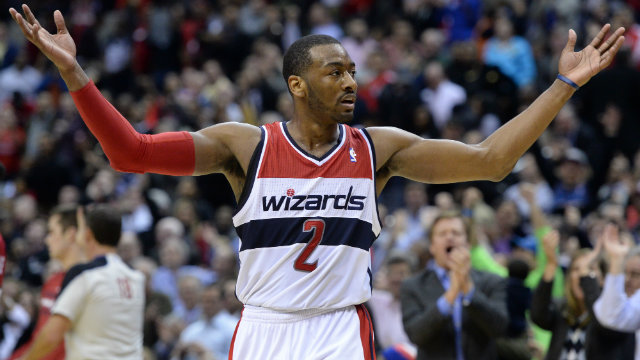
The Wizards may be the third-best team in the East despite the loss of second-leading scorer Trevor Ariza. This is on account of the young backcourt of John Wall and Bradley Beal and a veteran cast that was further reinforced with the addition of first-ballot Hall of Famer Paul Pierce, DeJuan Blair and Kris Humphries. Wall (19.3 ppg, 8.8 apg, 1.8 spg) is a first-time All-Star beginning to fulfill his great promise while Beal, who will miss the first month of the regular season with a broken left wrist, broke out in the postseason with 19.2 points, 5.0 rebounds and 4.5 assists. But it’s the addition of Pierce who could spell the difference for this squad particularly at crunch time despite a career-low 13.5 points in Brooklyn for the former Boston Celtic. Marcin Gortat (13.2 ppg, 9.5 rpg, 1.5 bpg) and Nene Hilario (14.2 ppg in 53 games) have made the Wizards tough to score against inside, and they’ll get further help from veteran bruisers DeJuan Blair and Kris Humphries. After surprisingly beating Chicago last year in the first round, their first playoff series win in nine years after earning their first postseason berth since 2008, these Wizards won’t surprise anyone if they go even farther this time around.
2. Miami (1st, 54-28)
Key additions: Luol Deng (Cleveland), Josh McRoberts (Charlotte), Danny Granger (LA Clippers), Shabazz Napier (rookie)
Key losses: LeBron James (Cleveland), Ray Allen (free agent), Shane Battier (retired), Rashard Lewis (free agent), Michael Beasley (China), James Jones (Cleveland)
No matter what Chris Bosh, Mario Chalmers and, most of all, Dwyane Wade say about the departure of LeBron James and how they’ll compensate for the humongous loss of the game’s biggest name, this team is simply not the same not only in talent level but more so in the ability to compete in the playoffs, make that the regular season as the Heat are bound to fall from their four-year perch at the top of their division. Luol Deng, Josh McRoberts, Danny Granger and rookie Shabazz Napier are all nice additions but nobody compensates for the loss of a James, notwithstanding the impending democratization of the load and the assumption by Bosh of the task of go-to scorer. James brought with him an equivalent of more than 40 points’ worth of offense a game, and his defensive contribution, while not at the same level that it used to be, is still better than most players’. Wade (19.0 ppg) and Deng (16.0 ppg) will have to step up even more to provide Bosh (16.2 ppg) the much-needed support on both sides of the court, as former stalwarts Shane Battier and Ray Allen are also gone along with veterans James Jones and Rashard Lewis.
3. Charlotte (3rd, 43-39)
Key additions: Lance Stephenson (Indiana), Noah Vonleh (rookie), P.J. Hairston (rookie), Marvin Williams (Utah)
Key loss: Josh McRoberts (Miami)
Michael Jordan’s team has a nice thing going here, and it’s bound to continue this year, with former Indiana bulldog Lance Stephenson and two nice rookies, forward Noah Vonleh and sharpshooting guard P.J. Hairston, joining All-NBA center Al Jefferson and floor leader Kemba Walker. The now-back-to-their-original name Hornets, then called the Bobcats, made their first playoff in four years last season after posting the all-time worst record in history at 7-59 in the lockout-shortened 2012 season, and they’re poised to make it two in a row. Stephenson (13.8 ppg, 7.2 rpg, 4.6 apg) brings with him a fearless attitude that should rub off on the other Hornets, plus the disruptive perimeter defense that should help a team with no real intimidator continue to be a good defensive team. Jefferson (21.8 ppg. 10.8 rpg), Walker (17.7 ppg, 6.1 apg) and Gerald Henderson (14.0 ppg) will join Stephenson as the Hornets’ primary offensive threats. If Charlotte can somehow make up for the loss of McRoberts’ playmaking at the frontcourt, second-year coach Steve Clifford can certainly improve this team further.
4. Atlanta (4th, 38-44)
Key additions: Thabo Sefolosha (OKC), Adreian Payne (rookie), Kent Bazemore (LA Lakers)
Key loss: Louis Williams (Toronto)
The team’s best player, Al Horford, was limited to 29 games after having been shut down in December with a torn right pectoral muscle. The 6-10 Horford will be back, and, with first-time All-Star Paul Millsap, Jeff Teague and Kyle Korver, gives the Hawks a solid though low-key nucleus. Millsap (17.9 ppg, team-high 8.5 rpg), Teague (16.5 ppg, 6.7 apg) and Korver (12.0 ppg) helped Atlanta to a surprise playoff berth, its seventh straight (only San Antonio has a longer streak with 17), and they figure to do it again this year with a roster that’s shorn of top bench scorer Louis Williams but with added defensive toughness after Thabo Sefolosha and Kent Bazemore were signed as free agents. Coach Mike Budenholzer, another rookie coach who surprised last season, should be able to figure this team out better on his second year particularly with his 17 years of experience as a Spurs assistant. If he does, look for these Hawks to do even better and perhaps overshadow the off-court distractions coming from racial issues that have seen the team being put up for sale by owner Bruce Levenson.
5. Orlando Magic (5th, 23-59)
Key additions: Channing Frye (Phoenix), Aaron Gordon (rookie), Elfrid Payton (rookie), Evan Fornier (Denver), Ben Gordon (Charlotte), Luke Ridnour (Charlotte)
Key losses: Arron Afflalo (Denver), Jameer Nelson (Dallas)
The loss to trade of top scorer Arron Afflalo as well as top playmaker Jameer Nelson (he spent all 10 of his NBA years with the Magic before being waived) will hurt Orlando, but is there any question this ballclub would rather go through the pits now rather than be a mediocre team? Of course, everyone knows that the Magic are rebuilding and are saving cap space and stockpiling draft picks for the future. First-round picks Aaron Gordon and Elfrid Payton are reputed to be staunch defenders, and veteran stop-gaps Channing Frye and Ben Gordon will help free up space for big man Nikola Vucevic down low with their outside shooting, but, by and large, this team is going through a major reconstruction, with Vucevic (14.2 ppg, 11.0 rpg), incoming sophomore Victor Oladipo (13.8 ppg), Tobias Harris (14.6 ppg) as well as the two rookies representing the future. The Magic, of course, are hoping they can add a few more solid pieces to give their fans some relief after having lost more games (121) than any other team since Dwight Howard left in 2012. – Rappler.com
 Bert A. Ramirez has been a freelance sportswriter/columnist since the ’80s, writing mostly about the NBA and once serving as consultant and editor for Tower Sports Magazine, the longest-running locally published NBA magazine, from 1999 to 2008. He has also written columns and articles for such publications as Malaya, Sports Digest, Winners Sports Weekly, Pro Guide, Sports Weekly, Sports Flash, Sports World, Basketball Weekly and the FIBA’s International Basketball, and currently writes a fortnightly column for QC Life and a weekly blog for BostonSports Desk. A former corporate manager, Bert has breathed, drunk and slept sports most of his life.
Bert A. Ramirez has been a freelance sportswriter/columnist since the ’80s, writing mostly about the NBA and once serving as consultant and editor for Tower Sports Magazine, the longest-running locally published NBA magazine, from 1999 to 2008. He has also written columns and articles for such publications as Malaya, Sports Digest, Winners Sports Weekly, Pro Guide, Sports Weekly, Sports Flash, Sports World, Basketball Weekly and the FIBA’s International Basketball, and currently writes a fortnightly column for QC Life and a weekly blog for BostonSports Desk. A former corporate manager, Bert has breathed, drunk and slept sports most of his life.
Add a comment
How does this make you feel?
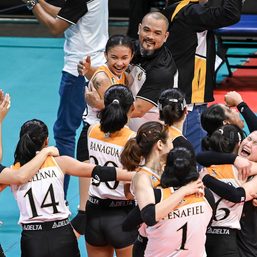
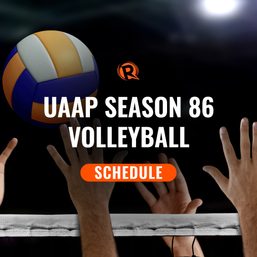
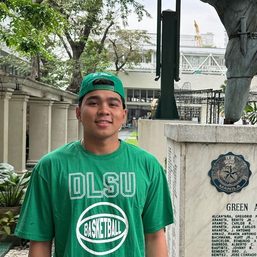
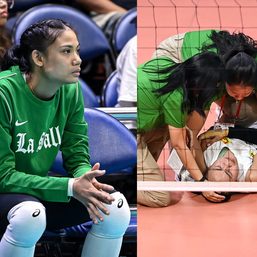
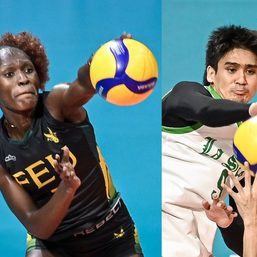
There are no comments yet. Add your comment to start the conversation.